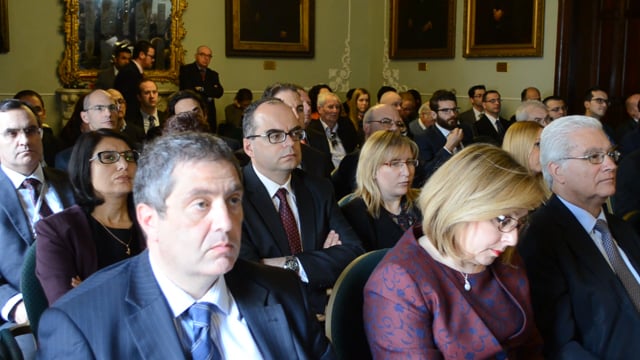[WATCH] HSBC Malta posts €47 million pre-tax profit, down 10% over 2014
New CEO Andrew Beane committed to ‘strict cost reduction’ • Adjusted profit before tax, excluding effect of early retirement payment, was €61.5 million, or 18% up on 2014



HSBC Bank Malta has reported a profit before tax of €46.8 million for the year ended 31 December 2015 – a decline of €5.3m or 10% on the previous year.
This result was achieved in an environment characterised by unprecedented low levels of interest rates, deflationary pressures and slow growth in the eurozone and expanded regulatory demands.
“In 2015 the operating environment for eurozone banks remained difficult with record low interest rates and higher operating costs, principally driven by new regulation. HSBC Malta’s underlying profitability was strong and our signature capital strength and conservative risk appetite enabled the bank to perform well in the European Central Bank’s regulatory assessments,” CEO Andrew Beane said.
Beane said that since taking over in November, HSBC Malta had taken decisive action to reduce costs, resolved a long-running union dispute and made a number of key leadership appointments.
“Our strong balance sheet has enabled the bank, with the support of our regulator, to increase the dividend pay-out ratio from 55% to 65% so that a greater share of profits is returned to our owners.”
Beane said he was committed to HSBC’s 10,000 local shareholders by investing in banking professionals to raise customer service standards and sustaining strict cost discipline. “Despite the challenges our industry faces, HSBC Malta is in a strong position to navigate these and I am confident about the future,” Beane said.
Referring to long-standing disputes with various unions, Beane said that the clarification of the issue culminating in the signing of collective agreement had enabled the bank to look at future developments and focus on growth for the coming year.
“HSBC is here to do business and we are here to support all our customers, including individuals and big and small individuals alike to thrive,” he said, looking forward to 2016.
On an adjusted basis, excluding the effect of non-recurring expenses for the early voluntary retirement provision, profit before tax was up €9 million or 18% on the previous year.
Chief Financial officer Rashid Daurov said that the voluntary early retirement programme which started last year was expected to make substantial savings, significantly cutting down staff costs which make up some 50% of the bank’s cost-base.
Beane added that the bank had set aside €1 million to brink genera; banking risk provision, as stipulated by Banking Rule 09 to its full requirement.
Profit attributable to shareholders amounted to €29.5 million resulting in earnings per share of 8.2 cents compared to 9.3 cents in 2014.
The board recommended a final gross dividend of 2.6 cent per share (1.7 cent per share net of tax). Together with the interim dividend paid in September 2015, the total gross dividend for the year will be 7.7c per share (5c per share net of tax), which represents a 20% increase compared to 2014 dividend adjusted for the bonus share issue in April 2015. The final dividend will be paid on 19 April 2016 to shareholders who are on the bank’s register of shareholders at 16 March 2016.
Net interest income was up by 4% to €127 million compared with €122.6 million in 2014. Lending margins on both retail and commercial loan portfolios were under pressure, yields on the investment portfolio declined despite the growing portfolio balance as maturing higher yielding bonds could be replaced only at significantly lower rates. The drop in interest income was offset by the reduction in the cost of funding as deposit rates continued declining and more customers moved to shorter-dated deposits.
Operating expenses of €118.8 million were €20.2m or 20% higher compared with previous year. The early voluntary retirement programme launched at the end of the year under review, as part of the bank’s efforts to improve productivity and cost effectiveness, was the main driver for the increase in 2015 costs.
Loans and deposits
Loan impairment charges were €10.8 million compared to €22.5 million in 2014. In line with last year, the board maintained a cautious approach to provisioning for non-performing loans.
In particular, in 2015 a decision was taken to set aside impairment provision for retail exposures which have been non-performing for a certain number of years. These exposures are well covered by collateral.
Despite the total drawdowns of nearly €550 million during 2015, net loans and advances to customers at €3,285 million were 0.5% up on 2014. The higher pace of early repayments observed in the last two years in both the commercial and retail loan books continued in 2015.
Supported by government incentives for first time buyers, the mortgage book, the bank’s largest lending portfolio, continued to perform well resulting in a net growth of over €60 million in 2015. This, however, was offset by the reduction in corporate lending where repayments were higher as a result of the persistent low interest rate environment.
Customer accounts continued to grow in the year under review and reached €4,950 million, an increase of 1.7% from 31 December 2014. Notably, deposits from retail customers, the most stable funding base, demonstrated robust growth and increased by 6.5%. During 2015, liquidity position of the bank remained solid with an advances-to- deposits ratio of 66.4%.






.jpg)

















